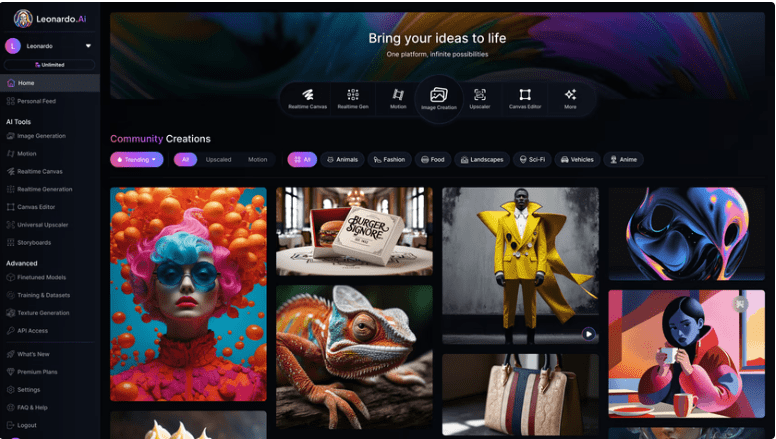Canva has quickly risen to be THE leading platform for small business, entrepreneurs and freelancers for all things design. It’s easy to use tools and constant innovation have earned it the top spot. It also continues to invest in its platform and dive into AI.
It recently announced its acquisition of the 120 employee company, Leonardo.Ai. Canva’s blog post reads, “With Leonardo.Ai’s incredible foundational model, and team of 120 high-caliber researchers, engineers, and designers, this acquisition bolsters our ability to supercharge our growing suite of AI products while investing in continued research and innovation to unlock the future of visual AI.”
Canva’s Magic Studio is a game changer, and this acquisition continues that evolution.
Since Magic Studio launched, it has been used more than 7 billion times. Canva has seen a 40% increase in monthly users this year alone leveraging our AI tools for everything from summarizing documents to creating images and turning brainstorm whiteboards into fully-fledged presentations.
The best way small business owners are going to use AI, is by the apps we use investing in it and seamlessly embedding it into their software.
Intuit Quickbooks, Zoho, Salesforce and dozens of other brands are quickly investing into having AI readily available to use in their platforms.
So what’s inside Leonardo.AI that made it a juicy acquisition for Canva?
From beginners to professionals, Leonardo’s intuitive capabilities fuse simplicity and power to produce incredible results. Its models can generate stunning images in styles ranging from hyper-realistic photos to character portraits, anime, painterly styles, and more. Its AI video generation tool brings almost any concept to dynamic life, from animated illustrations to storytelling sequences. Leveraging a slew of cutting-edge features, Leonardo excels in model fine-tuning, accurate prompt interpretation, training speed, inference pace, and multi-image prompting capabilities.
10 Ways to Use AI In Your Business
- Automate customer service: Implement AI chatbots to handle basic inquiries 24/7, freeing up your team for more complex issues.
- Personalize marketing: Use AI-powered tools to analyze customer data and create tailored marketing campaigns that resonate with your audience.
- Streamline hiring: Employ AI-driven applicant tracking systems to sort through resumes and identify top candidates more efficiently.
- Enhance cybersecurity: Utilize AI-based security software to detect and prevent potential cyber threats in real-time.
- Optimize pricing: Leverage AI algorithms to analyze market trends and competitor pricing, helping you set optimal prices for your products or services.
- Improve inventory management: Implement AI-powered inventory systems to predict demand, reduce waste, and ensure you’re always stocked with the right items.
- Boost productivity: Use AI-assisted project management tools to streamline workflows and automate repetitive tasks.
- Generate content: Employ AI writing assistants to help create blog posts, social media content, and product descriptions more quickly.
- Analyze customer feedback: Utilize AI sentiment analysis tools to gauge customer satisfaction from reviews and social media mentions.
- Forecast sales: Implement AI-driven forecasting models to predict future sales trends and make more informed business decisions.
Related articles:











